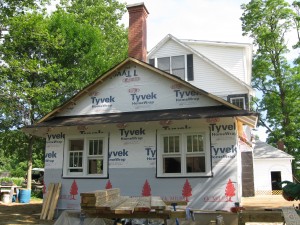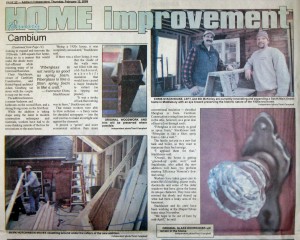This story appeared in the Feb. 12, 2009, edition of the Addison Independent.
“Fiberglass is not nearly as good as spray foam. Fiberglass is like a filter; spray foam is like a wall.” — Contractor Chris Stackhouse By JOHN FLOWERS MIDDLEBURY — When workers are done with the South Main Street home of Alex Draper and Lorraine Tobias in April, they will leave an energy-efficient residence that will retain its historic character — at almost twice its current size. Last week saw crews from Middlebury-based Cambium Construction hammering away at the Draper/Tobias project, the centerpiece of which is a two-story, 1,200-square-foot addition. The family of four had been looking to expand and renovate the 1920s-era, 1,400-square-foot home, doing so in a manner that would make the abode more fuel-efficient while retaining many of its historical flourishes. Chris Stackhouse, owner of Cambium Construction, and Bristol-based architect Adam Ginsburg sat down with the couple to map out the work.The addition features a master bedroom and bathroom on the second floor, and a dining/living room on the first floor.While the addition is taking shape using the latest in modern construction techniques and materials, workers have had to do some thinking outside of the box for renovations to the main house. “Being a 1920s house, it was completely uninsulated,” Stackhouse said. If there was a silver lining, it was that the inside of the walls were not filled with any old-fashioned, makeshift insulation that would have caused a major headache to extract (as in ripping out plaster). “It was a stroke of luck that nothing was in there,” Stackhouse said. That means workers were able to blow cellulose — a fancy name for shredded newspaper — into the wall cavities to make an airtight seal against the elements. It proved a “green” and more economical solution than more conventional insulation — shredded fiberglass or foam. Cambium Construction is using foam insulation in the attic, however, as a great deal of heat is lost through roofs. “Fiberglass is not nearly as good as spray foam,” Stackhouse said. “Fiberglass is like a filter; spray foam is like a wall. “The family just put in a new fuel tank and boiler, so they want to maximize their fuel savings.“I applaud them for that,” Stackhouse said.“Overall, the house is getting ‘greened-up’ quite well,” said Stackhouse, who added the new addition will have “no problem meeting Efficiency Vermont’s five-star rating.” Workers have taken great care to retain the old molding, plaster walls, doorknobs and some of the older windows that have given the home its unique character. They have also rewired the abode and shored up what had been a leaky area of the basement. Stackhouse and his crew have been working at the Draper/Tobias home since November. “We hope to be out of here by mid-April,” he said.
~ Design - Build ~
![Putnam Barn [640x480] Completed barn project Weybridge.](http://www.cambiumconstruction.com/build/wp-content/uploads/Putnam-Barn-640x480.jpg)
![SheldonRatcliff [640x480] Completed addition & deck Waltham](http://www.cambiumconstruction.com/build/wp-content/uploads/SheldonRatcliff-640x480.jpg)
![Sheldon Ratfcliff details [640x480] Details designed by Chris, in keeping era of home.](http://www.cambiumconstruction.com/build/wp-content/uploads/Sheldon-Ratfcliff-details-640x480.jpg)


![TobiasDraper [640x480] Built by Cambium Construction and designed by Adam Ginsburg Architect.](http://www.cambiumconstruction.com/build/wp-content/uploads/TobiasDraper-640x480-300x225.jpg)